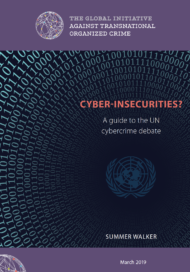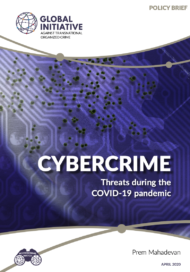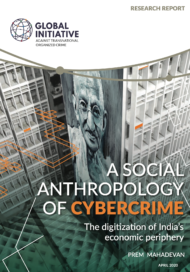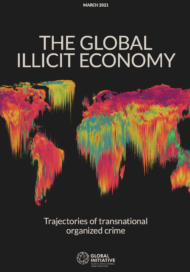Posted on 07 May 2021
In May 2021, countries at the United Nations are set to restart a process to debate and possibly draft a treaty ‘on countering the use of information and communications technologies for criminal purposes’. This initiative stems from UN General Assembly Resolution 74/247, which called for ‘an open-ended ad hoc intergovernmental committee … to elaborate’ such a treaty, and which was adopted in December 2019.
Postponed twice due to COVID-19, countries will hold an organizational meeting on 10–12 May to agree on an outline and modalities for the committee’s work. These meetings may sound routine, but are actually very important. The committee will decide some essential steps, possibly on how the negotiations will take place, who will manage the process and what type of participatory model there will be, including how to include all member states, the private sector and civil society. These decisions determine the level of transparency and inclusion the process will have, and ultimately the ability for stakeholders to influence this critical policy agenda.
While there are regional cybercrime treaties, there is no UN legal instrument on cybercrime. A typical timeframe to negotiate a treaty of this kind varies: the Council of Europe Convention on Cybercrime took four years to negotiate, the UN Convention against Transnational Organized Crime (UNTOC) took two years. Already off to a slow start due to COVID-19, the cybercrime process faces a lack of consensus among member states over the need for a convention together with disagreements over many issues, not least the meaning and scope of ‘the use of information and communications technologies for criminal purposes’. States also have significant differences on key issues for combating cybercrime, such as internet governance, transborder access to data, regulation of online content and data ownership.
The process, which has been led by Russia, was initiated by vote in the General Assembly, rather than consensus (as would usually be the case for a major new international treaty), and a number of member states question the likelihood of reaching agreement on a global treaty. The policy agenda on cyber issues is highly fractious, with tensions over keeping cybersecurity and cybercrime separate and keeping cybersecurity off the formal Security Council agenda. But if this process does lead to a convention, it will have major implications globally. Much depends on how the boundaries of the treaty are drawn, but it is nevertheless clear that cybercrime – and the related global risks of rising authoritarianism, digital election interference, misinformation for geopolitical and political ends and digital social segregation – is now a policy space of critical importance.
Cybercrime and civil society at the UN
Until now, the UN platform addressing cybercrime issues has been the open-ended intergovernmental expert group (IEG), established ‘to conduct a comprehensive study of the problem of cybercrime’, which operates within the Commission on Crime Prevention and Criminal Justice. The IEG is wrapping up a three-year work plan (2018–2021) to produce a stocktaking report for member states on issues that could feed into this next process, such as legislation, law enforcement, investigations, evidence, justice, international cooperation and prevention.
While it is unclear how the two processes relate to each other, and indeed with the other broader UN cyber processes, the IEG draws attention to a critical question: how will civil society contribute to the work of the ad hoc committee? While the IEG’s current agenda included substantive discussions among practitioners, policy makers and experts from member states, while inviting other stakeholders as observers – in particular the private sector and academia – there is no explicit mention of civil society. Given the potential reach and impact of a global treaty, it is essential that a wide range of civil society organizations are aware of the new process, engaged in it and connected to one another.
The space for civil society at the UN is closing, and COVID-19 has further shrunk the space available to NGOs to engage at the multilateral level. While this trend is accelerating across the UN in general, this has been demonstrated in crime policy by member states endorsing weak commitments to civil society in the UNTOC Review Mechanism and UN Convention against Corruption, despite the relatively open processes for engagement that gave birth to those treaties. Weakened references to civil society were also evident in the 2021 Kyoto Declaration at the 14th UN Crime Congress, along with restricted access for NGOs in meetings in all of these forums.
As the cybercrime process restarts, civil society must have access to the discussions to present the interests of citizens and contribute evidence-based research into these highly political debates. In this, both civil society and member states must be mindful of the diversity of civil society, and the consequent diversity in its viewpoints. There will be a wide variety of specialisms and levels of influence and power, from major tech companies to local community-based NGOs. Even within the non-commercial sector there is major diversity, including:
- Those with a direct interest or expertise in cybercrime, such as security analysts, academia, cybercrime specialist experts and think tanks, and even non-state outfits that monitor and try to disrupt cyber criminality.
- Human rights and digital rights NGOs and advocates.
- Anyone engaged in analyzing or mitigating the damaging effects of all types of illicit markets. This is potentially as diverse as the civil society constituency looking at TOC more generally, as all types of markets now have an online or cyber element.
Given the many areas of expertise, this mix of civil society brings added value to policy formulation that would not be included otherwise, but civil society must coordinate and engage if it wants to have an impact. For their part, member states, when agreeing the modalities in May, need to ensure that the process builds on best practice and buck the recent trend towards exclusion of civil society at the UN. Open consultation with civil society must be part of the process’s mandate.
Despite the lack of consensus on the potential convention and the diversity of civil society voices with an interest, what civil society can do is come together to input and exchange ideas with the process, and make itself – through the usefulness of its interventions and the value that it adds – an integral part of the process.
Photo: UN Photo/Kim Haughton, Cyber Cocoon Kids Exhibition Opens at UN Headquarters



